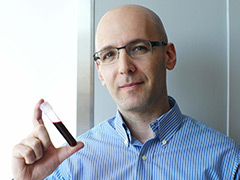Scientists capture tri-council funding
By Alisa Kim
The Canadian Institutes of Health Research (CIHR) awarded six Sunnybrook Research Institute (SRI) scientists with operating grants in its March 2014 competition. The awards total $4.2 million over the next five years. The competition’s funding rate was a tough 17.7%.
“Congratulations to each of our scientists who secured research investment. It is exemplary of their excellence and hard work to be selected in such a competitive funding environment,” said Dr. Michael Julius, vice-president of research at SRI and Sunnybrook Health Sciences Centre.
Dr. Isabelle Aubert, a senior scientist in the Brain Sciences Research Program, was awarded $981,308 over five years. She will use the funds to study the effects of magnetic resonance imaging-guided focused ultrasound for targeted delivery of therapeutics to the brain in preclinical models of Alzheimer’s disease. Aubert has done preclinical studies using the technology to deliver anti-amyloid agents, and gene and stem cell therapy through the blood-brain barrier. More on this work is detailed in the story Breaching Barriers, published in the 2013 SRI Magazine.
Dr. Stuart Foster, a senior scientist and imaging physicist in the Odette Cancer Research Program, was awarded $731,378 over five years to develop gas nanostructures as a new contrast agent in ultrasound imaging. The nanostructures enable imaging outside the vascular system and are genetically coded, which opens up possibilities that they could act as reporter genes, similar to green fluorescent protein. Foster recently published a study in Nature Nanotechnology showing for the first time that the gas nanostructures can be used as molecular “reporters” in ultrasound imaging. Read Thinking Small to learn more about Foster’s research.
Dr. Benjamin Goldstein, a clinician-scientist in the Brain Sciences Research Program, will receive $692,124 over five years to study how biological factors in the brain and body are linked to brain circuitry and circulation in adolescents with bipolar disorder. Read about Goldstein’s search for biomarkers in the blood to optimize diagnosis and treatment of bipolar disorder in youth in the fascinating story Mood Disorders Across Our Lives.
Dr. Mario Masellis, a clinician-scientist in the Brain Sciences Research Program, was awarded $932,818 over five years. He will use the funds to develop biomarkers that can identify the earliest stages of frontotemporal dementia, a group of disorders associated with personality and behavioural changes, as well as language difficulties in those with the disease.
Dr. Richard Swartz, a scientist in the Brain Sciences Research Program, was awarded $725,535 over four years. He will use the funds to test whether screening for depression, obstructive sleep apnea and cognitive impairment—common conditions after a stroke—can help identify people at high risk of poor outcomes after a stroke.
Dr. Hannah Wunsch, a critical care physician at Sunnybrook, with co-investigators Dr. Robert Fowler and Dr. Damon Scales, clinician-scientists in the Trauma, Emergency & Critical Care Research Program at SRI, were awarded $189,225 over three years for an ambitious endeavour: to identify risk factors and outcomes following rehospitalizations for elderly patients who are critically ill.
The total investment of CIHR was $251.5 million over nine years, an increase of about 4.7% over the amount invested in the previous competition.






